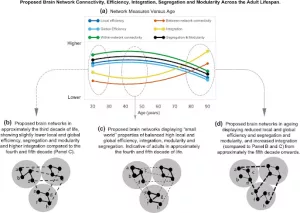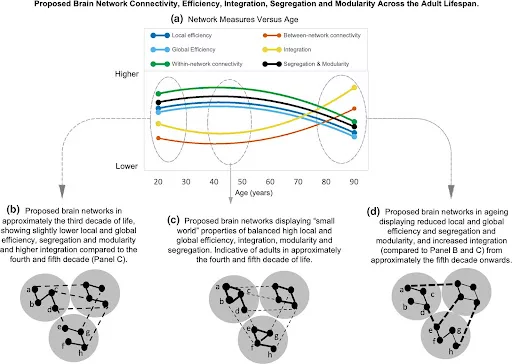At the age of 40!
In an article published in Harvard Gazette, researchers explored human cognitive development from 26 years to 106 years. What they found might not be encouraging for those of you who are older than 40!
What Researchers Tell Us About Aging
Brain tissue from 30 patients was analyzed by the same researchers at Children’s Hospital in Boston and Harvard. Alterations in genes happen while one is learning and memorizing. It was also evident that damage to these genes was induced by everyday pressures. Interestingly, similar patterns of aging and relatively little gene damage are seen in the brains of people aged between 26 and 40. It was predicted that the brains of 73 years old and up would show more signs of impairment.
In contrast, the middle ages brought a shocking development. It was found that Individuals’ genetic profiles varied widely between the ages of 40 and 70. Wide variations were seen as some showed characteristics more typical of younger people and others more typical of older people. These findings imply that harmful shifts may begin considerably earlier than assumed.
Exceptionals: The Ever Green
However, this is not always the case. The data also shows that our brains have protective and repair systems that can offset the effects of gene damage. Proper medications or lifestyle modifications could delay cognitive impairments. Hence these can guard against the beginning of brain disorders in the long run.
What the Future Holds!
In the future simple testing to determine who is at the highest risk for Alzheimer’s disease or other age-related illnesses may become possible. For example, maybe through blood and skin cells if they share the same fingerprint of aging.
More Recent Studies About Aging
Recently, another group of researchers from Monash University has outlined how brain connections grow throughout a lifetime in the Journal of Psychophysiology. With the available data they showed After age 40, the brain begins a considerable “rewiring” that integrates and couples various networks, which has cognitive implications.
Neuroscientists’ Explanation Of Aging
Neuroscientists have come to see the brain as a complex network since the turn of the century, with regions, sub-regions, and individual neurons all playing important roles. These parts work together either structurally or functionally or in certain cases both. Scanning technologies have improved to the point where neuroscientists can now view the regions of people’s brains that “light up” in reaction to stimuli or even while they’re at rest, giving them a glimpse of the ways in which our brains are coordinated.
Studies were done extensively
Researchers from Monash University reviewed 144 studies that utilized these imaging methods to examine the brains of thousands of people. The researchers were able to extrapolate a lifetime pattern in how the brain’s network evolves from this study.
Executive Summary
The rapid development of functional brain networks occurs during early childhood. Once we reach our third and fourth decades of life, the functional networks continue to mature. The reviewers found that “aging can result in a complex interplay of potentially detrimental and compensatory changes.”
When we are adolescents and young adults, our brains appear to have multiple, partitioned networks with high levels of inner connection, which reflects the capacity for specialized processing. That’s not surprising, considering that childhood is when most of us first pick up a ball, a language, or a musical instrument. However, by the time we reach our mid-40s, things begin to alter. Rather, the brain shifts from being highly interconnected within individual networks to being globally interconnected across many. When we reach old age, the brain typically becomes more interconnected and less locally specialized.
The cognitive implications of this “rewiring” are palpable.

The reviewers concluded that “older persons tend to demonstrate less flexible thinking,” including difficulties with “creating new concepts and abstract thinking,” “lower reaction inhibition,” and “poor verbal and quantitative reasoning.” Consistent with the findings of the systematic review, “these executive function alterations can be noticed initially in adults in the fifth decade of life,” which is when the inflection point of functional network connection changes occurs.
Don’t Worry, Be Happy!
There is good news for the aging brain, though. Vocabulary and general knowledge, both of which rely on automatic or well-practiced procedures, “are less affected by age” or “may even rise modestly across the lifespan,” as the authors put it.
For what reason, then, do these alterations in neural connectivity manifest themselves?
Some educated guesswork was made by the reviewers. They made the observation that glucose, a simple sugar, is desperately needed by the brain. While only making up about 2% of total body weight, the adult brain consumes about 20% of the body’s glucose supply, they said.
Age Just Right!
However, as we age, our bodies naturally slow down and our brains become less effective. Because of this, glucose intake is down and the brain isn’t making efficient use of the fuel it does have. Therefore, it is reasonable to conclude that the brain is restructuring its networks in order to make do with declining resources and aging “hardware.”
Any way to delay the rewiring?
Maintaining cognitive function with a combination of proper nutrition, exercise, and lifestyle choices can delay the need for major alterations in one’s network infrastructure until later in life, even in the very elderly.
Future Scopes
Although our brain’s inner workings will likely remain a mystery for the foreseeable future, this massive systematic examination of thousands of brain scans could help us obtain a glimpse of the ways in which our brains develop and evolve over time.
